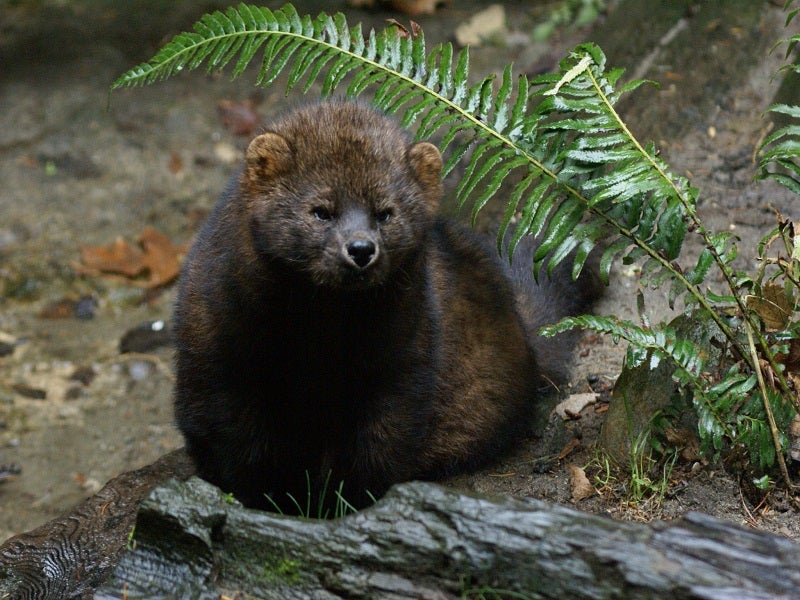Lawsuit Initiated Over Politically Motivated Decision Denying Protection to Pacific Fishers
Rare carnivore has been reduced to two populations in California, Oregon
Contact
Four conservation groups filed a notice of intent today to challenge the U.S. Fish and Wildlife Service’s decision in April to deny Endangered Species Act protection to Pacific fishers, the latest species to fall victim to the Service’s efforts to cater to industry. Closely related to martens and wolverines, Pacific fishers are severely threatened by a number of factors, including habitat loss caused by logging and the use of toxic rodenticides on illegal marijuana growing sites. Although the Service had recently proposed federal protections for Pacific fishers, the agency reversed course at the last minute in a bow to the timber industry.
U.S. Fish & Wildlife Service
West Coast Distinct Population Segment of fisher (historical range and 2004 Finding range boundary). View larger map
“Fishers are staring extinction in the face, so it’s deeply disheartening to see Fish and Wildlife deny them the protection they need to survive,” said Justin Augustine, a senior attorney at the Center for Biological Diversity. “Science, not politics, is supposed to drive these kinds of decisions, and that didn’t happen here.”
Fishers once roamed from British Columbia to Southern California, but due to intense logging and trapping, only two naturally occurring populations survive today: a population of 100 to 300 fishers in the southern Sierra Nevada and a population of 250 to a few thousand fishers in southern Oregon and Northern California. They have been reintroduced in three populations in the northern Sierra, southern Cascades and Washington state.
The decision to deny protections to the Pacific fisher is the latest in a string of politically motivated decisions from the Fish and Wildlife Service, in which regional staff overruled decisions by Service biologists to protect species. Two months ago a federal judge in Montana criticized the Service for bowing to political pressures in illegally reversing a proposal to protect the estimated 300 wolverines remaining in the lower 48 states. And in December 2015 conservation groups filed a lawsuit against the Service for inexplicably denying protection to Humboldt martens, another rare West Coast carnivore on the brink of extinction.
Sierra Nevada Adaptive Management Project
A rare daylight capture of a Pacific fisher. Find out how this photo was taken.
A survey conducted by the Union of Concerned Scientists last year indicated many Service scientists believe that increasingly there is inappropriate interference with science within the agency.
“The U.S. Fish and Wildlife Service’s denial of their own stated concerns and threats to this rare forest carnivore strongly suggests the agency has lost its professional courage to uphold its mission to protect biodiversity due to political pressure. Politics has no place in listing decisions,” said Susan Britting, executive director of Sierra Forest Legacy.
”Service scientists recently found that Pacific fishers are on the brink of extinction and face increasing threats from logging, climate change and especially from the indiscriminate use of toxic rodenticide poisons on marijuana grow sites,” said George Sexton, conservation director for the Klamath Siskiyou Wildlands Center. “The Service acknowledged these challenges supported the need for federal protection before deciding that politics was more important than the survival of the species.”
“Today the Pacific fisher has been isolated to just two locations in the United States,” said Greg Loarie, an Earthjustice attorney who drafted the notice. “If this doesn’t justify the U.S. Fish and Wildlife Service using our bedrock environmental law—the Endangered Species Act—to protect an animal that needs our help to survive, then I don’t know what does.”
Timeline
1994
Petition filed to protect fisher.
2000
Second petition filed.
2004
Fisher added to the candidate waiting list.
(Service determines fisher warrants protection but is precluded by higher priority species.)
2010
Lawsuit filed over delay in protecting the fisher. (Service agrees under subsequent settlement decision to issue a decision.)
2014
Service announces proposed rule that would have protected fishers as a “threatened” species.
April 2016
Service abruptly withdraws its proposed rule.
Today
Notice of intent filed to challenge the April decision.
Efforts to protect the West Coast fisher have been going on for decades. The Center for Biological Diversity first petitioned to protect the fisher in 1994, and the four conservation seeking protection for the species today filed a second petition with allies in 2000. In 2004, the fisher was finally added to the candidate waiting list, when the Service determined that the fisher warranted protection but was precluded by higher priority species. In 2010, the Center sued over the delay in protecting the fisher and the Service agreed under a subsequent settlement decision to issue a decision this year. In 2014, the Service announced a proposed rule that would have protected Pacific fishers as a “threatened” species. But the Service abruptly withdrew its proposed rule in April of this year.
“The fisher has waited long enough for protection,” said Tom Wheeler, program director for the Environmental Protection Information Center. “No amount of agency delay, political pressure or obfuscation of science can change the truth: The fisher is threatened with extinction.”
The groups issuing today’s notice are the Center for Biological Diversity, Environmental Protection Information Center, Klamath-Siskiyou Wildlands Center and Sierra Forest Legacy. They are represented by Earthjustice.

Additional Resources
About Earthjustice
Earthjustice is the premier nonprofit environmental law organization. We wield the power of law and the strength of partnership to protect people's health, to preserve magnificent places and wildlife, to advance clean energy, and to combat climate change. We are here because the earth needs a good lawyer.